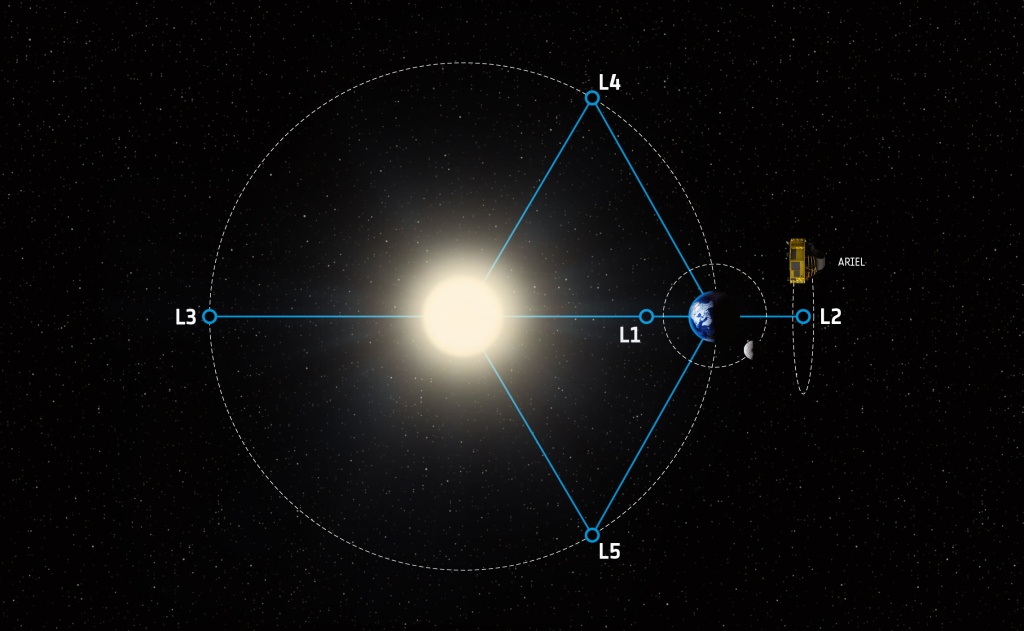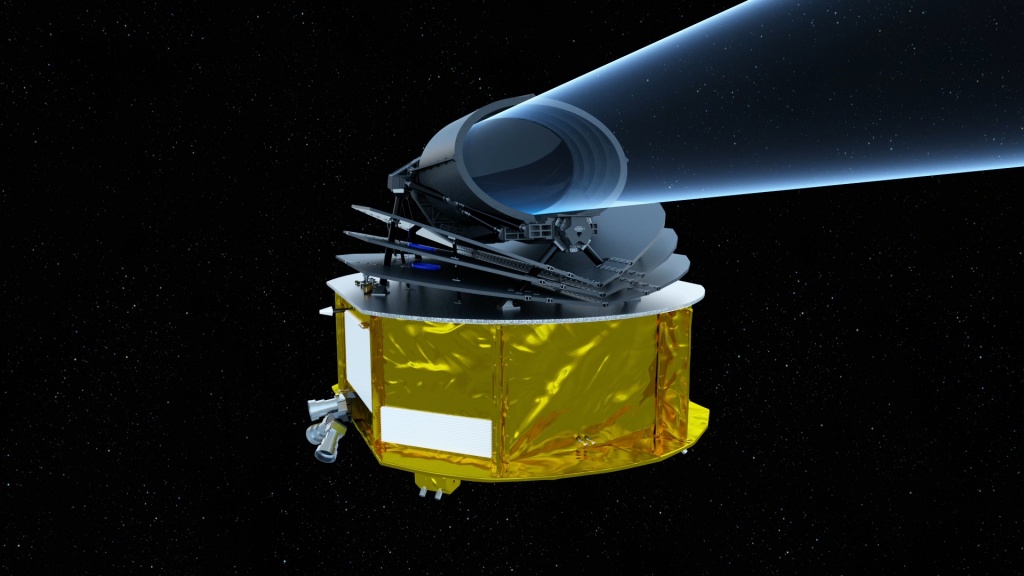Winners announced for the machine vs stellar and instrument noise data challenge
Artificial intelligence (AI) experts from around the world have been competing for the opportunity to help astronomers to explore planets in our local galactic neighbourhood.
The European Space Agency’s Ariel telescope, which launches in 2029, will study the atmospheres of around 1000 planets outside our solar system, known as exoplanets.
Observing faint signals to measure the make-up of exoplanet atmospheres is incredibly challenging and is made even more so by other signals the instrument may pick up. The effect of star activity, like sun spots, and even the noise of the spacecraft itself can obscure the information scientists receive from Ariel.
The Ariel Machine Learning Data Challenge, sponsored by Spaceflux Ltd, was set to harness the expertise of the artificial intelligence community to help disentangle this unwanted noise from the light filtering through exoplanet atmospheres. Over 110 teams from around the world participated with 35 teams submitting viable solutions. The teams represented a mix of academia and AI companies.
The competition winners, ML Analytics, an artificial intelligence company in Portugal, and a team from TU Dortmund University in Germany were able to achieve highly accurate solutions for even the most difficult to observe planets.
Luís F. Simões from ML Analytics said: ‘To advance our knowledge of exoplanets, we will first need to advance our knowledge of Artificial Intelligence. The Ariel mission will need predictive models that can extract information with extremely high accuracy from noisy sensor data. Building such models is akin to engineering at very small scales: at some point quantum effects start to manifest themselves, and conventional wisdom no longer applies. The Ariel Machine Learning Data Challenge provided the ideal setting in which to design the modelling approaches that can lead to such error-free models. It is an honour for me and ML Analytics to be able to play a part in this process of discovery,that will tell us so much about the universe and our place in it.’
Mirko Bunse from TU Dortmund University said: ‘To disentangle the atmospheric properties of exoplanets from the massive amounts of noise is only possible through machine learning models that are trained by sophisticated simulations. Since the first edition of this challenge in 2019, we have seen significant improvements in the Ariel simulations, which also lead to better machine learning-based analyses of the telescope data. We expect further improvements to stem from expert input: are all training examples equally important? Should the machine learning model obey certain boundary conditions? We are excited to take part in these developments and to see the solutions of the other 5 top-ranked teams.’
The winning teams will receive a cash prize of €500 and will be recognised at the Europlanet Science Congress 2021 in an award ceremony on Friday 24 September. The teams will present their research at the European Conference on Machine Learning and Principles and Practice of Knowledge Discovery in Databases (ECML PKDD) on Wednesday 15 September and will also present at the Ariel Conference in November. Their solutions will help the mission team correct for brightness variabilities from stars and sensitivity variations of the instrument enabling them to measure the radius of the planet correctly and discern the chemistry of their atmospheres.
Dr Ingo Waldmann, Associate Professor in Astrophysics, University College London and Ariel Machine Learning Data Challenge lead said: ‘Artificial Intelligence will play an increasingly important role in exoplanet research. Many of the cutting-edge AI solutions can be applied to the very difficult data sets the exoplanet field has to offer. Data challenges such as this one not only provide tangible new solutions to long standing problems, they also help to bridge the gap between both the exoplanet and AI communities. I believe that a closer collaboration between exoplanet and AI research will not only benefit Ariel science but astronomy in general.’
The top three runners up, DeepBlueAI, an AI company based in Shanghai, a team from the Aalen University in Germany, an AI researcher at the University of Tubingen in Germany, will each receive €200 and will present a shorter talk at the ECML workshop.
This was the second Ariel Machine Learning Data challenge. With each competition the Ariel science team is able to work towards a programme which will enable them to get the best quality data from Ariel. By looking at their atmospheres we can understand how these planets formed, what they’re like and ultimately, put the eight planets in our own solar system into context.
Images
Ariel will be placed in orbit around the Lagrange Point 2 (L2), a gravitational balance point 1.5 million kilometres beyond the Earth’s orbit around the Sun. Image Credit: ESA/STFC RAL Space/UCL/Europlanet-Science Office

https://arielspacemission.files.wordpress.com/2017/11/ariel_lagrange_points_high_res1.jpg
Artist’s impression of Ariel. Image Credit: ESA/STFC RAL Space/UCL/UK Space Agency/ ATG Medialab

https://arielspacemission.files.wordpress.com/2020/11/ariel-telescope.jpg
A hot planet transits in front of its parent star in this artist impression of an exoplanet system. ESA/ATG medialab, CC BY-SA 3.0 IGO
https://www.esa.int/ESA_Multimedia/Images/2018/03/Hot_exoplanet
Videos:
Note: Please get in touch with press contact for mp4 files.
Ariel animations: https://www.youtube.com/playlist?list=PL7nlYuIpjicaxp36LxZwkXOH72Otf-rgY
Welcome to Ariel: https://youtu.be/28afJ_5TTGc
Contacts:
Madeleine Russell
Ariel Consortium Communications Lead and RAL Space Communications Manager
Mob: +44 (0) 7594083386
Email: madeleine.russell@stfc.ac.uk
Notes to editors:
Ariel (Atmospheric Remote-sensing Infrared Exoplanet Large-survey)
Ariel, a mission to answer fundamental questions about how planetary systems form and evolve, is a European Space Agency (ESA) medium-class science mission due for launch in 2029. During a 4-year mission, Ariel will observe 1000 planets orbiting distant stars in visible and infrared wavelengths to study how they formed and how they evolve. It is the first mission dedicated to measuring the chemistry and thermal structures exoplanet atmospheres, enabling planetary science far beyond the boundaries of the Solar System.
The Ariel mission has been developed by a consortium of more than 50 institutes from 16 ESA member state countries, including the UK, France, Italy, Poland, Belgium, Spain, the Netherlands, Austria, Denmark, Ireland, Czech Republic, Hungary, Portugal, Norway, Sweden, Estonia – plus USA contribution from NASA.
Twitter: @ArielTelescope | YouTube: Ariel Space Mission | arielmission.space
Ariel Machine Learning Data Challenge
https://www.ariel-datachallenge.space/
Ariel consortium
The Ariel mission payload is developed by a consortium of more than 50 institutes from 17 ESA countries – which include the UK, France, Italy, Poland, Belgium, Spain, the Netherlands, Austria, Denmark, Ireland, Czech Republic, Hungary, Portugal, Norway, Sweden, Germany, Estonia – plus a NASA contribution.
UCL – London’s Global University
UCL is a diverse community with the freedom to challenge and think differently.
Our community of more than 41,500 students from 150 countries and over 12,500 staff pursues academic excellence, breaks boundaries and makes a positive impact on real world problems.
We are consistently ranked among the top 10 universities in the world and are one of only a handful of institutions rated as having the strongest academic reputation and the broadest research impact.
We have a progressive and integrated approach to our teaching and research – championing innovation, creativity and cross-disciplinary working. We teach our students how to think, not what to think, and see them as partners, collaborators and contributors.
For almost 200 years, we are proud to have opened higher education to students from a wide range of backgrounds and to change the way we create and share knowledge.
We were the first in England to welcome women to university education and that courageous attitude and disruptive spirit is still alive today. We are UCL.
www.ucl.ac.uk| Follow @uclnews on Twitter | Watch our YouTube channel | Listen to UCL podcasts on SoundCloud | Find out what’s on at UCL Minds | #MadeAtUCL
EPSC2021
The Ariel Machine Learning Data Challenge will be presented on Friday 24 September 2021 during the Europlanet Science Congress (EPSC) 2021 during the prize lectures session from 14:20-14:50 CEST. For details see: https://meetingorganizer.copernicus.org/EPSC2021/session/41825
EPSC2021 is taking place as a virtual meeting from 13-24 September 2021. The EPSC2021 programme covers the full spectrum of planetary science and technology across 43 sessions. More than 840 oral and poster presentations have been submitted by planetary scientists from Europe, the US and around the world. The EPSC2021 virtual meeting has a hybrid format of asynchronous presentations and discussion alongside a programme of live events, which runs from Thursday 16 – Friday 24 September.
The Europlanet Science Congress (https://www.epsc2021.eu/) is the annual meeting place of the Europlanet Society and is the largest planetary science meeting in Europe.
Follow on Twitter via @europlanetmedia and using the hashtag #EPSC2021.
EPSC2021 is sponsored by Space: Science & Technology, a Science Partner Journal.

